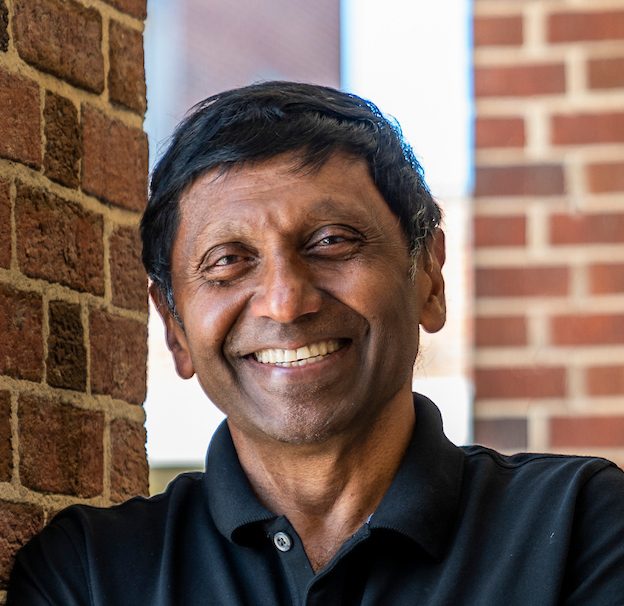People

Ratnasingham Shivaji
Professor
Graduate Program Director
- H. Barton Excellence Professor
- Fellow of the American Mathematical Society
Office: Petty 148
Email: r_shivaj@uncg.edu
Personal Website: http://www.uncg.edu/~r_shivaj/
Starting year at UNCG: 2011
Office Hours: Virtual: MAT 390 W 12:00pm-1:30pm; MAT 394 W 2:00pm-3:30pm; or by appointment via zoom on Canvas
Education
Degree(s): Ph.D. in Mathematics, Heriot-Watt University (1981), B.Sc (First Class Honors) (Special Degree in Mathematics), University of Sri Lanka, Peradeniya (1977)
Teaching
Fall 2024- MAT-396 LEC (Calculus C), M 1:00-1:50, SULV 103
- MAT-396 LEC (Calculus C), TR 12:30-1:45, SULV 103
- MAT-735 LEC (Ordinary Differntial Equations), TR 3:30-4:45, PETT 217
- MAT-494 IND (Directed Study in Mathematics)
Research
Member of the Research Group(s): Applied Math, Mathematical Biology
Current Students: Melissa Glass (Ph.D.)
Former Students: Dustin Nichols (Ph.D 2024), Alketa Henderson (Ph.D 2024), Amila Muthunayake (Ph.D 2021), Nalin Fonseka (Ph.D 2020), Mohan Mallick (Ph.D. 2019), Quinn Morris (Ph.D. 2017), Byungjae Son (Ph.D. 2017), Dagny Butler (Ph.D. 2014), Lakshmi Sankar (Ph.D. 2013), Eunkyung Ko (Ph.D. 2012), Sarath Sasi (Ph.D. 2012), Jerome Goddard II (Ph.D. 2011), Jinglong Ye (Ph.D. 2009), Jaffar Ali (Ph.D. 2008), Scott Caldwell (Ph.D. 2003), Shobha Oruganti (Ph.D. 2002), Maya Chhetri (Ph.D. 1999), Anuradha Vishwanathan (Ph.D. 1994), Eun Kyoung Lee (Postdoc. 2007 - 2009)
Research Interests: Study of non-negative solutions to steady-state reaction-diffusion equations arising in the modeling of natural phenomena including ecology and combustion theory. Recent results focus on singular problems, nonlinear diffusion, and nonlinear boundary conditions.
Selected Publications
- A uniqueness result for infinite semipositone p-Laplacian problems in a ball, K.D. Chu, D. D. Hai, and, R. Shivaji, Complex Variables and Elliptic Equations (accepted for publication in 2021).
- A uniqueness result for a class of infinite semipositone problems with nonlinear boundary conditions, D. D. Hai, A. Muthunayake, and R. Shivaji, Positivity (2021), https://doi.org/10.1007/s11117-021-00820-x.
- Uniqueness for a class of p-Laplacian problems when the reaction term tends to zero at infinity, K.D. Chu, D. D. Hai, and, R. Shivaji, Journal of Mathematical Analysis and Applications (2021), no. 2, https://doi.org/10.1016/j.jmaa.2020.124576.
- Modeling the effects of trait-mediated dispersal on coexistence of mutualists, J.T. Cronin, J. Goddard, A. Muthunayake, and R. Shivaji, Mathematical Biosciences and Engineering (2020), Vol. 17, Issue 6: 7838-7861, https://www.aimspress.com/article/doi/10.3934/mbe.2020399.
- Uniqueness for a class of singular quasilinear Dirichlet problem, K. D. Chu, D. D. Hai, and R. Shivaji, Applied Mathematics Letters (2020), Vol. 106, Article no. 106306, https://doi.org/10.1016/j.aml.2020.106306.
Brief Biography
Ratnasingham Shivaji joined the University of North Carolina at Greensboro (UNCG) as Head in July 2011 and served in this position until July 2019. Since January 2012, he is also serving as H. Barton Excellence Professor. Prior to joining UNCG, he served for twenty-six years at Mississippi State University (MSU), where he was honored as a W.L. Giles Distinguished Professor. He received his Ph.D. in Mathematics from Heriot-Watt University in Edinburgh, Scotland in 1981 and his B.S (first-class honors) from the University of Sri Lanka in 1977. Shivaji’s area of specialization is partial differential equations, and in particular, nonlinear elliptic boundary value problems. His research work has applications in combustion theory, chemical reactor theory, and population dynamics, and has been funded by the National Science Foundation and the Simon’s Foundation. Currently, he is serving as the PI on an NSF Math Ecology grant. To date, he has authored one hundred seventy three research papers. He was honored as a Fellow of the American Mathematical Society (AMS) for research contributions, mentoring, and leadership. He is the recipient of the 2020 Mathematical Association of America (MAA) Southeastern Section Award for Distinguished University Teaching of Mathematics. He is a member of the Editorial Board of several mathematics journals. To date, he has directed one postdoctoral student, nineteen Ph.D. students (16 graduates, 3 current), fifteen M.S. graduates, and thirty one undergraduate research students (29 past, 2 current).





